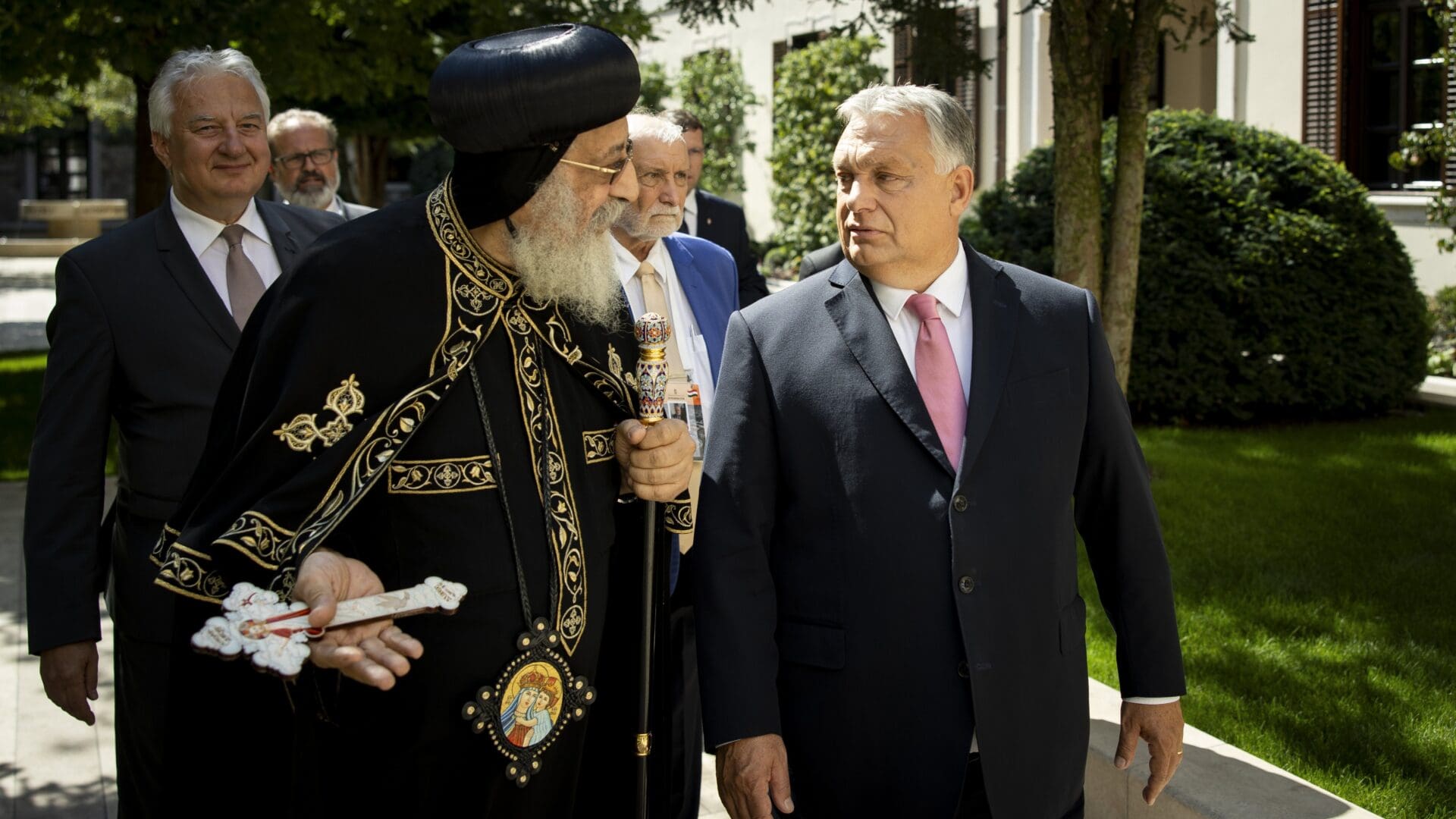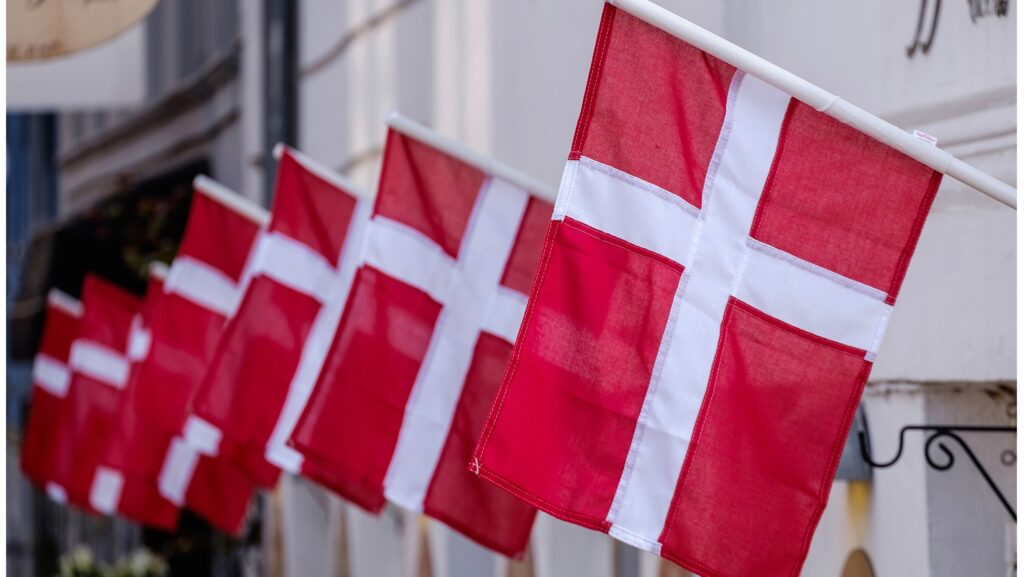His Holiness Pope Tawadros II accepted an invitation from the Hungarian government to visit the country for the Hungarian National Day celebrations from August 19 to August 22. During his four-day visit, he met with Hungary’s President, Prime Minister, and the Archbishop of Esztergom. He also received an honorary doctorate from Pázmány Péter Catholic University, and led a mass at the Coptic church in Budapest.
The leader of the Coptic Orthodox Church, the oldest Christian church in the world, was greeted by Deputy Prime Minister Zsolt Semjén at Budapest’s Liszt Ferenc Airport. Archbishop of Veszprém György Udvardy, Coptic Orthodox Bishop of Austria Anba Gabriel, Coptic Orthodox Bishop of Central Europe Ava Giovanni and Mohamed Ibrahim Abdelkhalek Elshinawy, Egyptian ambassador to Hungary, were also present to welcome Pope Tawadros II.
During his meeting with Prime Minister Viktor Orbán, the two discussed the strong connection and brotherhood between Eastern and Western Christians. Prime Minister Orbán emphasised Hungary’s commitment to supporting Christian communities worldwide. Pope Tawadros II expressed gratitude to the PM for Hungary’s continued assistance, including scholarships provided to Egyptian students, and highlighted the significance of upholding family values.
Tawadros II delivered a speech at the dinner held at the Egyptian Embassy in Budapest on Sunday, 20 August 2023, where he highlighted the rich civilisation and history of Egypt, adding that he has always felt that ‘Egypt is kept in God’s heart.’ The Coptic Pope highlighted the close connections between Hungary and Egypt, and commended the Egyptian ambassador for working on further strengthening the ties between the two countries.
The Strong Cooperation Between the Hungarian Government and the Coptic Church
In 2022, the Danube Institute’s podcast series recorded an episode with Abouna Youssef Khalil, the head of the Holy Virgin and the Archangel Michael Orthodox Church in Hungary. In the discussion, Abouna Youssef spoke about the history of Hungary’s Copts. After the end of Communism in 1990, a small number of Coptic Egyptians began coming to Hungary, seeking to work hard and help build a country that had before been unfriendly to Christianity as a result of its Marxist state ideology. Former Coptic Pope Shenouda III personally called Abouna Youssef to be the leader of this community in the early 2000s and after a slow but steady growth of the community,
Pope Shenouda visited Hungary to consecrate the nation’s first and only Coptic Church.
It was his last such ceremony, as Pope Shenouda passed away less than a year later in 2012. In the conversation, Abouna Youssef expressed his appreciation of Hungary for its openness and acceptance of religious minorities.
The cooperation between the Hungarian government and the Coptic Church has been strong since the establishment of the Hungarian Coptic Church. When Pope Shenouda III visited Hungary in 2011 to consecrate the church, he also came at the invitation of the Hungarian Deputy Prime Minister Zsolt Semjén to take part in the 20 August celebrations marking the National Day of Hungary. During his visit, Pope Shenouda III was also granted an honorary doctorate degree by Pázmány Péter Catholic University in Budapest. Pope Shenouda was awarded Germany’s Augsburg Peace Prize in 2011 for his role in building bridges between the Copts and Muslims in Egypt.
Pope Tawadros II continued the efforts of his predecessor, Pope Shenouda. During his sermon at the recently established Cathedral of the Virgin Mary, the Martyr Abi Sven, and Saint Anba Karas in a new residential area in west Alexandria, he praised President Abdel-Fattah El-Sisi’s initiative to build mosques, churches, and schools in every new residential community in his sermon. ‘My first visit to this church was in 2020 when President Abdel-Fattah El-Sisi inaugurated it,’ the Pope pointed out. He added that the president established this church, along with a mosque and three schools, in one courtyard to allow students to see the mosque’s minaret and the church’s dome together. Tawadros emphasised that the younger generation who witness mosques and churches side by side will gain respect for one another and uphold Egypt’s unity.
Despite Positive Relationship with the Egyptian Government, Coptic Church Still Faces Violence
The roots of Christianity in Egypt can be traced back almost two millennia. Coptic Christians, who have their own distinct culture and language, have been living in the country since before the arrival of Muslim Arabs. For the most part, Muslims and Christians coexisted peacefully in Egypt until the mid-twentieth century.
However, things turned for the worse due to growing radical Islamism and anti-Christian sentiments in the country. Almost ten million Christians live in Egypt today,
making it the largest Christian minority in the Middle East.
According to the 2023 World Watch List compiled by Open Doors, Egypt is the 35th most dangerous country for Christians in the world. Muslims make up almost 85% of the Egyptian population, with the vast majority being Sunni and more than 90% of Christians are Coptic Orthodox.
As David Curry, the president and CEO of Global Christian Relief, previously the CEO of Open Doors USA, explained, even though there is a strong Christian presence in Egypt, they still suffer from violence and discrimination at a community level by Muslim extremists. David Curry highlighted that Christians are persecuted in Egypt because false anti-Christian theologies that are taught in mosques and even in school textbooks take root in the minds of Muslim Egyptians from a young age.
However, it’s important to mention that there have been positive developments in the treatment of Christians in Egypt, with President El-Sisi regularly expressing support for the community. In 2015, he made history by becoming the first president to visit the St. Mark’s Cathedral Coptic church on Christmas Eve. He also celebrated the Coptic Christmas in 2023 at the Birth Of The Christ cathedral. Another significant improvement was that in February 2022,
El-Sisi appointed the first-ever Coptic Christian to lead the country’s Supreme Court.
Despite the Coptic Church’s positive relationship with the Sisi government, according to Open Doors’ World Watch List, Christians in Egypt still face religious violations at a community level. Weak law enforcement leaves them vulnerable to attacks, with security services sometimes being complicit. Incidents vary from Christian women being harassed in the street or Muslim mobs forcing Christians to move out after an alleged blasphemy accusation. Such incidents occur mostly in rural areas of Upper Egypt and in certain urban areas where Salafist movements are active. Reportedly, Christian women and girls from disadvantaged backgrounds remain vulnerable to grooming, forced conversion and forced marriage. Christians with a Muslim background face enormous pressure from their families to return to Islam.
Pázmány Péter University Awards Honorary Doctorate to Tawadros II
Pope Tawadros II received an honorary doctorate from Pázmány Péter Catholic University. As he accepted the degree, he expressed gratitude for the recognition of the Coptic Church’s loving work in Egypt and around the world. In his speech at the ceremony, the Coptic Orthodox Church leader emphasised that his church is committed to science, education, and social development, as exemplified by the Church’s various institutions, such as schools, hospitals, student dormitories, and facilities for refugees and the homeless. Tawadros II praised the Hungarian government’s emphasis on education and science and thanked the scholarship opportunities for Egyptian students. He also pointed out that Christian social development is based on five types of love: love of God as creator, love of God’s creation, love of neighbour, love of country, and love of eternity. The Coptic Church leader called it the duty of Christians to choose love even when confronted with a ‘greedy and selfish world.’ He stressed the importance of standing up for the values of the family and called for a united and firm stand against those who desecrate human nature as created by God.








